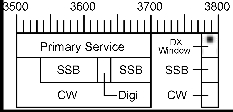80 metres
Related wiki pages Bands, Propagation Antennas
| Band: 80m | |
| Bands | |
| 160m 80m 60m 40m 30m 20m 17m 15m 12m 10m 6m 4m 2m 1.25m 70cm 33cm 23cm 3cm | |
| Band Privileges | |
| US Extra | 3.500-4.000 |
| US Advanced | 3.525-3.600 3.700-4.000 |
| US General | 3.525-3.600 3.800-4.000 |
| US Technician | 3.525-3.600 (CW only) |
| UK (all) | 3.5-3.8 |
80 metres is primarily used for contacts within a local region. Reliable communication over modest distance are a primary feature of the band. Many regional nets meet on this band on a regular schedule.
The upper half of the 80 metre band (3.75 MHz - 4.00 MHz), which is used primarily for SSB, is often known as 75 metres.
Equipment
Most multiband amateur HF equipment supports the 80 metre band. Single-band 80 metre rigs are also available from Oak Hills Research and Small Wonder Labs.
Because natural noise levels (QRN) are high on this band, QRP operations may be somewhat more difficult than on higher-frequency bands. However, it is very easy to homebrew equipment for the band, as designs, components, and construction techniques are not critical.
Modulation
Operation on the 80 metre band is primarily CW and SSB, but operators also use modes appropriate for HF such as AM, RTTY and SSTV.
Propagation
80 metres is primarily used for routine amateur contacts over distances of a few hundred kilometers, although longer-distance communication also occurs routinely.
Radio communication on this band suffers from D-layer absorption during the day, although not as severely as on 160 metres. Communication paths during daylight typically range up to a thousand kilometres. Long-distance DX contacts are possible at night through refraction of signals via the F2 layer.
Australian Bandplan
Access :
3.500 -3.700 MHz All licence classes
3.776 - 3.800 MHz Advanced licensees only
| Bands | |
| HF and MF | 160 metres * 80 metres* 60 metres * 40 metres * 30 metres * 20 metres * 17 metres * 15 metres * 12 metres * 10 metres |
| VHF | 6 metres * 4 metres * 2 metres * 1.25 metres |
| UHF | 70 centimetres * 33 centimetres * 23 centimetres * 13 centimetres |
| Microwave | 9 centimetres * 6 centimetres * 3 centimetres * 1.25 centimetres * Bands above 24GHz |
| See also | US bandplan |
